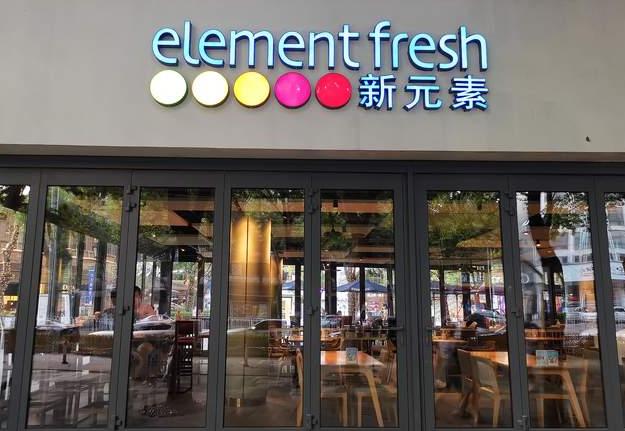Wen AI Finance and Economics He Chang
Edited by Mao Shiyang
Scott Minoie's ultimate goal as the founder of The New Elements Restaurant, a light food dining brand, is to "build new elements into China's number one fresh food brand," but at least for now, that good wish is in vain.
On December 14, the company owned by Element Fresh issued an internal notice to all employees, announcing that the company was in the stage of serious operating losses and capital chain ruptures, entering the bankruptcy liquidation process, and would gradually close its stores, central kitchens and administrative office operation support departments.
In this regard, on December 18, AI Finance and Economics called some stores in Beijing of new elements, and some staff said that they were still operating normally, but the store also received relevant notices of store closure. Regarding the stored value cards that have not yet been used, the staff member suggested that although they are used during this month, "at least this month is fine, and next month is less certain".
According to the official website, there are currently 31 domestic stores of new elements, distributed in 8 cities such as Beijing, Shanghai, Guangzhou and Shenzhen, including 13 in Shanghai, 9 in Beijing, and 2 in Guangzhou and Shenzhen. However, AI Finance and Economics found that the number of new element stores that are still in business is less than the aforementioned figures after the Meituan inquiry.
According to official information, after bankruptcy liquidation, for employees to sign a suspension agreement, from the date of suspension of work to pay the minimum wage and pay the minimum social security, as for the stores that have not been closed in the bankruptcy liquidation process, all employees of the company according to the performance appraisal and according to the company's cash flow to pay wages and determine the payment time, and encourage employees to find their own way.
A user who often patronizes the new elements lamented to AI Finance and Economics that due to the high frequency of business trips and the specific requirements for diet during fitness, the new elements have largely solved the problem of eating when she goes out. "Clean and healthy, both of these things can be satisfied, and now that it's so out of business, I don't even know what I should eat in the future."
Featuring salads, sandwiches, juices and cobies, as well as a variety of Asian local cuisines and creative dinner dishes, the new elements are one of the first light food brands in China to operate light food categories, and its history dates back 20 years. In 2000, Scott Minoie from the United States opened a juice bar in Shanghai. Two years later, he moved the store to Shanghai Centre, renamed it "New Elements", and added some Western-style light food categories in addition to freshly squeezed juice. Two years later, frank Rasche, a German who worked for Coca-Cola and had extensive market experience, became his partner. At that time, the two envisioned building the new elements into a catering brand with the concept of health, nutrition and freshness, and promoting it to more places, so as to become the world's top fresh food brand from China - this is also a new starting point for new elements.

Between 2004 and 2018, New Elements won a number of food and service awards, all of which were presented in the form of photos on the New Elements website. However, since 2020, the official website of the new elements has rarely been updated, and the news page has stayed in December 2019. In the notice, the new element mentioned that since the outbreak of the new crown epidemic in January 2020, the company's operation has encountered unprecedented great difficulties, and the operation of stores has been seriously affected. In the past two years, the store performance has recovered slowly and weakly, which has caused serious losses for the entire company.
Just last month, there were media reports that new elements were seeking to be sold and that the deal was in its early stages. In addition to the new elements, Another player in the light food track, Wagas, has also been revealed to be seeking to sell at a valuation of $800 million to $1 billion or more, with potential buyers including Yum China Holdings Ltd., Philippine restaurant brand Jollibee and Restaurant Brands International, the parent company of Burger King. When the news of the new element entering bankruptcy liquidation came out, some users said on social platforms: "Can Wagas survive?" ”
Around 2015, with consumers' attention to healthy diet and increased demand for fitness, a large number of light food brands emerged, and new elements were also proposed in that year to open 50 stores in China. The operating threshold of light food does not seem to be high, the process is simple and easy to operate, and it is also regarded as a sample that is easily copied. However, although in the eyes of some users, light food means "expensive" and "not worthy", in addition to ingredients, whether it is store location, supply chain or process standardization, it is always a problem in front of the brand, and the epidemic undoubtedly means worse.
This article is originally produced by AI Finance and Economics, an account of Caijing Tianxia Weekly, without permission, please do not reprint it on any channel or platform. Violators will be prosecuted.